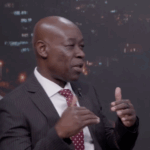
Lawyer and law lecturer Thaddeus Sory says not every form of judicial misconduct can be codified in law and insists that committees must be allowed to determine what constitutes misbehavior on a case-by-case basis.
Speaking on JoyNews’ PM Express on October 20, he argued that the Constitution was not meant to list every possible wrongdoing but to serve as a broad framework of governance that reflects public expectations.
“When you talk about the fundamental law of a land, you are not seeking to set out everything in detail,” he explained.
“It must be a compact document that sets out generally what we expect our framework of government to be like, because if you make it too ordinary and regulate every matter, people won’t respect it.”
Read also: Mahama removes Chief Justice Gertrude Torkornoo on grounds of stated misbehaviour
He said the concept of “stated misbehaviour” must be interpreted in light of public confidence in the judiciary. “Justice emanates from the people,” he said.
“So if your Chief Justice gets drunk whilst in office, that’s a stated misbehaviour. If she allows benefits for her family contrary to what the Constitution says, that too is misbehaviour. But you can’t set all of that out. That’s why you have a committee made up of lay people.”
Mr. Sory noted that ordinary citizens, not judges, are best placed to assess whether a Chief Justice’s conduct undermines confidence in the justice system.
“We, those involved in the justice system, judge ordinary men from whom justice emanates. If it affects us, let them also judge us,” he said.
He added that the committee system was designed to be fair and adaptable.
“They could say that under a particular situation, this is forgivable. It’s based on standards that must reflect the country’s own perception of what they expect.”
Responding to whether codifying such standards would make the system more predictable, Mr. Sory disagreed. “It will be limitless,” he said.
“Can anyone imagine every situation that might arise? If a judge’s personal conduct became public scandal, would we have predicted that? The committee must decide if that conduct affects the public image of justice.”
Read also: CJ removal: Definition of ‘stated misbehaviour’ still unknown – Baffour Awuah
He emphasised that leaving decisions to committees ensures accountability and fairness.
“At the end of the day, everybody is accountable to society,” he said. “If the people say they don’t like your style, that’s their judgment.”
Mr. Sory dismissed suggestions that case-by-case decisions invite unpredictability.
“It has predictability,” he insisted. “If the public sees that the head of the judiciary reverses a judgment for personal reasons, they will say they don’t like that. That’s the measure.”
He argued that the essence of constitutional maturity is not how detailed the document is, but how faithfully institutions uphold its spirit.
“There are constitutions over 200 years old with atrocious provisions,” he said. “Yet they remain because the people live with them. What matters is how we apply ours.”




